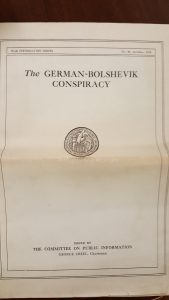
I chose to look at a pamphlet dated October 1918 that was part of the War Information Series of the Committee on Public Information. The German-Bolshevik conspiracy was a collection of communications between the German Imperial government and the Russian Bolshevik government obtained by Edgar Sisson, the Petrograd representative of the Committee on Public Information, that “show the present head of the Bolshevik Government—Lenin and Trotsky and their associates are German agents” and “that the current Bolshevik Government is not a Russian government at all but a German government acting solely in the interests of Germany and betraying the Russian people” (3).
I was surprised that Creel and the CPI would blame the Russian Revolution on the Germans. However, the presented relationship between the German Imperial government and the Russian Bolshevik government plays on public sentiment with factual evidence as a means of support. Though Lenin and Trotsky were not German, the CPI presents them as agents of Germany to stir more public sentiment against the Germans. The Germans were to blame for an Allied power withdrawing from the war, not the incompetence of the Czar or long-term peasant poverty and a growing industrial urban workforce that was discontent.
The CPI claims that the peace between Russia and Germany established in the Treaty of Brest-Litovsk is “harder upon the Russian people as punishment to the ambition of it tools in seeking to become too powerful, and in hoping…that they [Lenin and Trotsky] could double-cross their masters by turning a simulated German revolution into a real one” (15). The use of “tools” and “masters” to emphasize the totalitarian nature of the German government and builds on the social perception of the Germans as being powerful. The Russians almost became too powerful and so were put down by the Germans forcefully. The Russian people were suffering because of the greed of the Germans that were leading them. Lenin and Trotsky were enemies not only because they were socialists but because they were German agents.
The Russians are portrayed as having lost to the German government like how the German people. The US was fighting to save the German people from the German government. The Bolsheviks, however, were fighting with the German government and so must be as evil as the German government, if not more so for betraying the Russian people. The German empire was “the enemy” and so too were the Bolsheviks. Calling Lenin and Trotsky German agents places blame on the Germans for the October Bolshevik Revolution in 1917 and discredit the revolution.
Though the pamphlet addresses anti-German sentiment of the time, it neatly avoids the subject of socialism in the Russian state and does not mention the ideology of Lenin and Trotsky. The battle between socialists and the government in the US had in many ways already been won through the sedition act and the imprisonment of Debs. The CPI was focused on encouraging more anti-German sentiment rather than anti-socialism. Anti-socialist sentiments ran high as socialists opposed entry into WWI and tried to interfere with conscription laws, though many did, in the end, support the war effort.

Fascinating! Did you Google these? George Kennan (famous diplomat and scholar) argued that the pamphlets were forgeries. CPI used them as propaganda, but the “factual documents” weren’t real. https://en.wikipedia.org/wiki/Sisson_Documents
I had not googled them prior to writing the article. The post was just based on the document. The document did seem far fetched and opinionated though so I’m not surprised that the documents weren’t real.
Amazing! Great find.